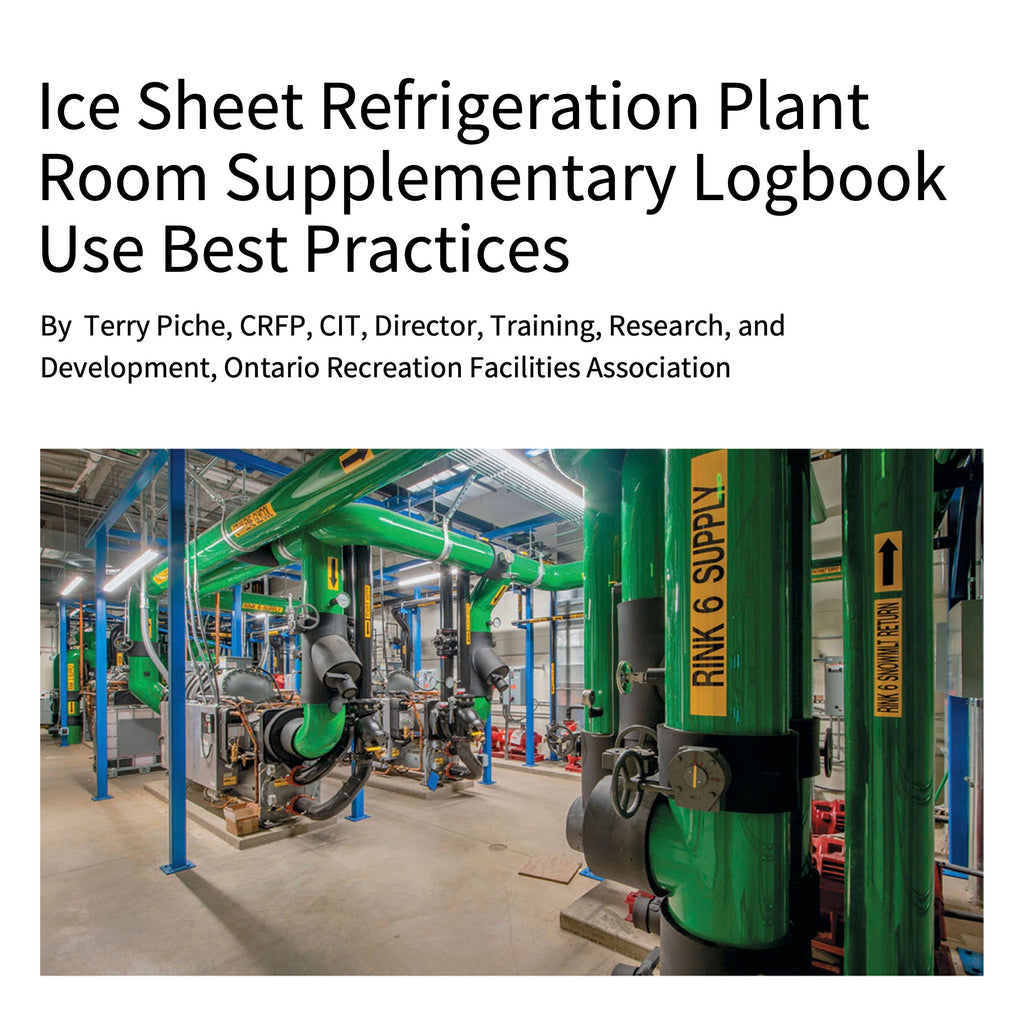Introduction
Disclaimer: the following information is provided as direction to what is considered industry best practice for registered ice sheet refrigeration plant recordkeeping. The information will reference portions of the Operating Engineers Regulation (OE) for discussion purposes only. It is the strict responsibility of the owner and/or user (responsible person) as defined in the OE to ensure compliance to the OE based on their specific operation.
Detailed recordkeeping of all facility equipment is a core responsibility of every facility manager to oversee. The ORFA continues to promote the necessity and benefits of maintaining asset management information through the Recreation Facility Asset Management (RFAM) software which is provided as a benefit of membership. Having detailed information that can be analysed will continually drive every aspect of the operation. Facility managers are data managers as much as they are infrastructure managers.
Recreation facility mechanical and electrical rooms are the vital organs that heat, cool and circulate air throughout the building. Each is critical to the health and longevity of the infrastructure. The information that is created and collected is in fact the legacy that each facility manager leaves behind for the next person who takes care and control of the asset. The information is also critical as service contractors change. Being able to look back into what has been performed, changed, adjusted, or updated will allow persons who will be providing the next repairs or maintenance to clearly understand what has already occurred.
Unattended vs Attended Ice Sheet Refrigeration Plant Operations
The OE provides specific direction to attended plants as to the authority the Chief Operator has in respect to the plant’s operation and maintenance. Once the “owner” selects the “Chief” they relinquish all control of how the Chief will operate the plant. The required logbook information that must be collected is defined in the OE for “attended” plants and the Chief must ensure compliance. The OE further provides clarity as to who in fact may make logbook entries:
(6) No person except the chief operating engineer, chief operator, a shift engineer, or a shift operator may make an entry in or sign the logbook. O. Reg. 219/01, s. 37 (6).
The requirements for unattended registered ice sheet refrigeration plants are not as clear. The obligation under the OE to have a logbook is stated in the OE as:
37. (1) Every user of a plant shall keep in the plant a log in the form of a book or electronic log. O. Reg. 219/01, s. 37 (1).
The challenge that each owner must consider is who in fact is the unattended plant “user”. Often the responsibility is “assumed” by a facility manager without clarity of responsibility.
Nowhere in the OE is clarification provided with respect to who can make entries into the required logbook. Considering the stated information in (6) that no person except the chief operating engineer, chief operator, a shift engineer, or a shift operator may make an entry in or sign the logbook O. Reg. 219/01, s. 37 (6),it may suggest that no one is qualified to make unattended plant logbook entries. This is operationally unreasonable. It will require an internal directive as to what qualifies a person to make entries in an unattended ice sheet refrigeration plant logbook.
Weaved throughout the OE are defined responsibilities of all stakeholders which are the owner, user, and operator. In some circumstances, the “user” could in fact also be an “operator” as defined in the OE. Defining roles and responsibilities to ensure compliance is a required internal discussion matter that should result in clearly written duties that are formally adopted.
Role of The Refrigeration Plant Service Contractor
Licensed refrigeration mechanics are an important and essential part of the plant’s maintenance team. However, it is essential to clearly define their role and responsibilities as part of the team. It is critical that facility management understand that the mechanics are exempt from any direct responsibility under the OE in respect to the plant’s operation and maintenance:
3. (2) This Regulation does not apply to, (a) a person who performs work in connection with a plant other than the actual operation of it
The service contractor must receive direction from the plant owner or user as to what work is to be performed. To meet this obligation the facility manager (user or responsible person), or a person selected to assist the facility manager in their duties, have a strong working knowledge of refrigeration plant operations, maintenance, emergency, and asset management. The ORFA Certified Arena Refrigeration Plant Technician designation pathway has been designed to assist plant owners and users in meeting this goal.
The Role of The Daily Plant Logbook
Operators who perform plant inspections need only to confirm that the plant remains safe and serviceable. When a human is not in the plant room it is “unattended” but is being continually “guarded” by the plant’s safety devices. As long as the safety devices are being maintained as prescribed by the manufacturer and hold an inspection date of less than 5-years, the plant has a low risk of a significant high-risk failure. The system is designed so that, if any plant safety device setting is exceeded, the system will shutdown. In our industry, this could mean the loss of the ice sheet if not detected but this presents a very low risk to human safety.
The information to be collected and how often in an unattended plant will need to be designed by the plant user (responsible person) based on the specific operation. Not one plant inspection schedule would fit every operation. Plants that are experiencing operational issues would require more inspection while properly maintained plants would need less ongoing monitoring.
The current industry best practice for unattended plant inspection is 3 inspections in every 8-hours that the ice sheet is staffed.
The reason for the inspections should be defined by the plant owner or user. In most cases, the observations are confirming that there are no changes in the standard operating parameters of the plant’s natural function. The operator is, in fact, a human safety device that is evaluating “slight” changes in pressures or temperatures which are indicators that additional monitoring may be required, a plant adjustment may be needed or a service contractor may need to be contacted. They are also capable of detecting small leaks or odours that may also be quickly addressed. The data that is being collected is also critical information that can be used by service professionals to determine the plant’s operational health and make appropriate adjustments, repairs, or recommendations for replacement to the plant owner/user. In an unattended plant, the operational information that is to be collected is left with the owner/user to define.
Consider the requirements for unattended plants:
37. (8) Shift entries to the log shall include,
(a) the date, the shift, and the times at which the shift begins and ends
(b) the names of all shift engineers, shift operators, assistant shift engineers, assistant shift operators, other staff and operating assistants or trainees on a shift and their periods of duty on the shift
(c) any instructions for the shift operation or for staff, along with the name of the person giving the instructions
37. (11) The chief operating engineer or chief operator shall read and sign the log at least once each business day. O. Reg. 219/01, s. 37 (11).
The ORFA refrigeration logbooks are designed by industry practitioners as reading collection best practices.
Members are reminded of the obligations under the OER for those responsible for maintaining a registered plant room logbook:
37. (2) Subject to subsections (3) and (4), the logbook shall be bound and constructed so that the pages are numbered and cannot be removed and shall be large enough to accommodate all the required entries.
O. Reg. 219/01, s. 37 (2).
37. (9) All logbook entries shall be in ink and any corrections shall not be erased but crossed out, corrected.
(10) No person shall deface, damage, destroy or, without the permission of the owner or user, remove the logbook from the plant. O. Reg. 219/01, s. 37 (10).
Why Have a Supplementary Plant Logbook
The daily plant logbook usually has limited space for detailed information on adjustments, repairs, maintenance, and incidents to be recorded. When these details are required, a note in the daily logbook to review the entry in the supplementary logbook can be made.
37. (7) Standing orders that are to be routinely followed shall be clearly documented in a location that is known and available to the persons to whom they apply, and supplementary logs shall be registered in the log. O. Reg. 219/01, s. 37 (7).
(8) (g) documentation of any repairs or maintenance, including that required under subsection 39 (9), to any part of the plant, the times the repair or maintenance took place, if they were completed and who attended at the repair or maintenance
(h) any malfunction of any item or equipment, the time of the occurrence and any remedial action taken to correct the malfunction
(i) any work performed by plant operating personnel outside the plant, the time spent and who attended at the work
(j) the entry of any unauthorized person to the plant, together with the purpose of the entry and the time of entry and leaving
Operational Best Practices
- Do read and stay in tune with all applicable registered plant legislative obligations
- Maintain and keep on file a primary registered refrigeration plant logbook
- Define who and what must be recorded in the logbook
- Train all staff responsible for record keeping on proper logbook entries
- Consider the benefit of having a supplementary logbook
- Select and train a “responsible person” to be in control of an unattended registered plant
- Ensure adequate financial and professional support is in place to maintain the equipment
- Create a specific maintenance plan to meet the recommendations of the equipment manufacturer and the OER for the registered refrigeration plant
Conclusion
The ORFA reminds members of the benefits of detailed logbook entries. This information serves as an important legal tool in the case of an incident and/or accident and will assist in proving operational diligence if every called into question.
The relationship the owner of the registered plant fosters with its mechanical contractor is an important part of safe plant operations but it is not a compliance fail safe device. Although there may be operational pressures applied to facility staff to maintain fiscal responsibility, such focus must never take precedent over refrigeration plant room operational safety.



